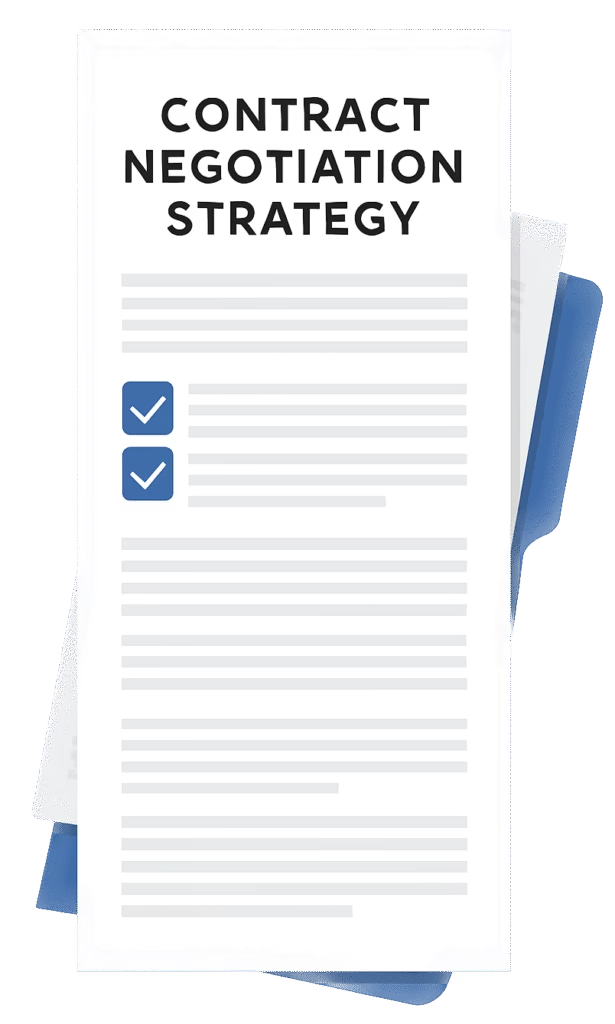Leveraging Limited Resources in Negotiations: How Startups Can Win Big on a Shoestring

Hey, startup founders, let’s get real: you’re not rolling into contract negotiations with a corporate war chest or a team of high-powered lawyers. You’re scrappy, strapped for cash, and probably burning the midnight oil to keep your dream alive. But here’s the good news—your startup’s limited resources don’t have to hold you back at the negotiation table. In fact, they can be your secret weapon! With the right mindset and some clever strategies, you can negotiate like a pro, secure killer deals, and outsmart even the big players.
In this fourth installment of our Contract Negotiation Strategies for Startups series, we’re diving into the art of leveraging limited resources in negotiations. Whether you’re hashing out a vendor deal, wooing a client, or pitching to investors, we’ll show you how to maximize your startup’s agility, creativity, and hustle to land terms that fuel your growth. Let’s dive in and turn those constraints into opportunities!
Why Limited Resources Can Be Your Superpower
Startups are lean, mean, fighting machines. Unlike bloated corporations, you’re nimble, innovative, and hungry for success. These qualities give you an edge in negotiations—if you know how to use them. Here’s why your resource constraints can work in your favor:
-
Agility: You can pivot quickly, offering creative solutions that bigger companies can’t match.
-
Personal Touch: Your small size lets you build genuine relationships, which can sway negotiations.
-
Hunger: Your drive to succeed makes you a compelling partner, as long as you channel it strategically.
The key is to approach negotiations with confidence, not apology. You’re not a small fish begging for scraps—you’re a dynamic startup with value to bring. Let’s explore three core strategies to leverage your limited resources and come out on top.
Strategy 1: Negotiating with Larger Companies Like a Boss
Big companies might have deeper pockets, but they’re often slower and less flexible. That’s where you shine! Here’s how to hold your own against the corporate giants:
-
Highlight Your Value: Emphasize what makes your startup unique—innovation, speed, or niche expertise. For example, a healthtech startup negotiating with a large hospital might pitch its cutting-edge AI tool as a game-changer, justifying favorable payment terms.
-
Offer Creative Trade-Offs: If you can’t compete on price, sweeten the deal with non-monetary benefits. Think exclusivity, early access to new features, or co-marketing opportunities. A small e-commerce startup might offer a vendor exclusive rights to distribute a new product in exchange for a discount.
-
Use Their Size Against Them: Larger companies often have bureaucratic processes. Use your agility to push for faster decisions or flexible terms they can’t easily replicate. For instance, negotiate a trial period with a supplier to test their service without committing long-term.
Example: Imagine you’re a fintech startup negotiating with a major bank for API access. Instead of accepting their standard pricing, propose a revenue-sharing model where they get a cut of your app’s subscription fees. This aligns incentives and leverages your limited budget creatively.
Actionable Tip: Research the company’s pain points (e.g., slow innovation, high costs) and position your startup as the solution. A quick scan of their recent posts on X or industry news can reveal what they’re struggling with.
Generate A Free Contract Negotiation Strategy Document
Create a comprehensive contract negotiation strategy document using proven frameworks like BATNA, ZOPA, and other negotiation models.

Strategy 2: Using Agility and Innovation as Bargaining Chips
Your startup’s ability to move fast and think outside the box is a massive asset. Here’s how to wield it in negotiations:
-
Propose Flexible Structures: Offer deal structures that play to your strengths, like phased payments or performance-based bonuses. A marketing startup might negotiate a client contract with a low base fee plus a bonus tied to campaign results, preserving cash while proving value.
-
Showcase Innovation: Highlight your startup’s unique tech, processes, or vision to justify better terms. For example, a clean-energy startup could negotiate a favorable supplier contract by emphasizing how its eco-friendly product aligns with the supplier’s sustainability goals.
-
Be the Test Case: Offer to pilot a new idea or product for the other party. This lowers their risk and positions you as a forward-thinking partner. A foodtech startup might convince a supplier to offer discounted ingredients for a pilot of a new plant-based product.
Example: A startup building a logistics app could negotiate with a delivery company by offering early access to its platform in exchange for reduced rates. The delivery company gets a competitive edge, and the startup saves on costs.
Actionable Tip: Prepare a one-pager showcasing your startup’s unique value proposition—think of it as your negotiation pitch deck. Keep it concise and punchy to grab attention.
Strategy 3: Negotiating When Cash Flow Is Tight
Cash flow is the lifeblood of any startup, and tight budgets can make negotiations feel daunting. But you’ve got options! Here’s how to negotiate when every dollar counts:
-
Defer Payments: Push for delayed or milestone-based payments to align with your revenue. For instance, a startup hiring a freelance designer might negotiate to pay 50% upfront and 50% upon project completion.
-
Barter Value: Offer services, equity, or future discounts instead of cash. A SaaS startup short on funds could barter a free year of its software for a vendor’s services.
-
Negotiate Scalability: Secure terms that grow with you. For example, negotiate volume discounts that kick in as your orders increase, ensuring costs stay manageable as you scale.
Example: A retail startup negotiating with a warehouse provider might request a sliding-scale rent based on inventory levels, keeping costs low until sales ramp up. Throwing in a promise of a long-term lease could seal the deal.
Actionable Tip: Run a quick cash flow projection to identify what payment terms you can afford. Use this to confidently propose deferred or phased payment structures.
Putting It All Together: Your Negotiation Game Plan
Ready to hit the ground running? Here’s how to turn these strategies into action:
-
Know Your Leverage: Identify your startup’s unique strengths—speed, innovation, or niche expertise—and weave them into your pitch.
-
Prep Like a Pro: Research the other party’s needs and constraints (check X for recent chatter about them). Use this to craft a win-win proposal.
-
Stay Nimble: Be ready to pivot if the other party pushes back. Have a list of trade-offs (e.g., exclusivity, extended timelines) ready to offer.
-
Use Tools: Leverage free or low-cost contract management tools like PandaDoc to track terms and streamline discussions.
-
Exude Confidence: You’re not a small player—you’re a startup with big potential. Walk into negotiations with the energy of someone who knows their worth.
Conclusion
Limited resources? No problem! Your startup’s agility, creativity, and hustle can turn negotiations into opportunities to shine. By leveraging your unique strengths, proposing innovative deal structures, and negotiating with cash flow in mind, you can secure terms that rival those of bigger players. So, gear up, get creative, and negotiate like the rockstar founder you are!
In the next article of our series, we’ll tackle Negotiating Vendor and Supplier Contracts, diving into strategies to lock in cost-effective, scalable deals. Until then, channel your inner scrappy startup and start prepping for your next negotiation win!
- RamenLegal
- RamenLegal



